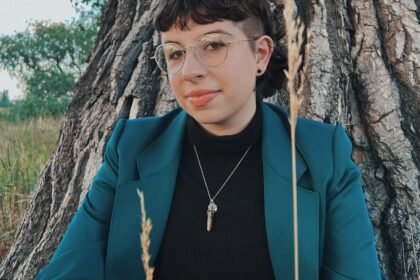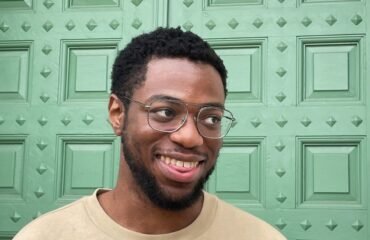LAST FACES, PAST FATHERS by Bri Gonzalez

after K-Ming Chang’s “Footnotes on a Love Story”
The greatest day of his life isn’t when his son is born. It isn’t when he learns he’ll be a father (for many hubris-heavy years, he thought he’d never* be one). The greatest moment isn’t his wedding, after he fell for his wife so deeply, surprising himself. Or the proud glint in both his mothers’ eyes** when he tells them—we’re expecting. We’re having a baby boy. Not the first time his wife says I love you, hands draped around his neck like a shawl, laced with wafts of lemon and paint thinner. It isn’t the time she kisses the bases of his palms*** as a boon. The greatest moment—after forty years’ worth of moments—is nothing remarkable. Partial clouds dilute sunrise. Eggs for breakfast. Scrambled but slightly runny, like residue rain slipping off a hot roof. His wife kisses his forehead the way a feather escapes a bird midair. His son, almost six, trips on himself and hits the floor like whump. His son doesn’t cry. Laying beneath the kitchen window, the kid absorbs daylight and spews it out**** with something like a pained laugh. His son stands, wobbles over, sits on his lap, and offers a crumpled piece of paper, bent in his fall. Indecipherable. Crayoned to the high heavens. Misspellings (or retellings) of his, his mother’s, and his father’s names. A note that he—the father—can’t understand but still tries***** to parse. Best. True. True? What. I. Happy. Or hurry. His son gifts it before stumbling away wordlessly. In the evening, around a dining table embroidered with loose bills and toy horses and pamphlets, his giggling son putting on voices only a child could master. His wife, brushing her husband’s hair to the side, leaves something tender at the bottom of his neck. Storm clouds roll in during dessert. He thinks, this, this is all I****** need. He dreams, and the dreams pluck light-poisoned eyes from his wife and son, who blink and laugh, disembodied.
*DISCLAIMER: Many nevers orbit his life until she picks them, one by one, and squashes them like errant bugs or a well-grown grape. She says, when asked why him—no, seriously, why him?—that she has the mundane ability to read marionette lines. Can translate who someone wants to be from two facial folds. And maybe she liked his best: shadowy, weak, but willful. He wasn’t meant to do what he did (leave her), not based on her predictions (the marionette lines), but it happened. Sometimes she thinks she must’ve willfully mistranslated him—other times, she accepts that she never saw it coming, that he’d taken her never and replaced it with a stained facsimile of himself. His side of the closet—all dust or hope—is gradually replaced with collections of oracle cards and books on beet farming.
**DISCLAIMER: When his mothers find out, news delivered by text from the woman who they know as their daughter-in-law (who writes I’m sorry and we’re still family), they say nothing. Over dinner, open iMessage as the centerpiece, his mothers remember the time he tried to glue his ears—protrusions he said were bulbous and ugly—to the side of his head so they wouldn’t stick out. Angles like catty-corners, then gone.
***DISCLAIMER: His hands on the table. His hands over his face, wet beneath, down his chin. His hands on the front door, magnetized, swinging it closed. His gentle hands on her gentle shoulders, phantom squeeze, a form of begging. Another chance for his hands to hold his child. The real reason he’s not home—his hands searching for some metaphysical truth, something she doesn’t understand, no matter how often he gesticulates through one explanation into the next. His hands illustrating the phrase find the truth of me and my body, which she thinks means he’s searching for a purpose he already has. He once told her he’s not sure what else he’s meant to exist for. Never clarified if he was talking about his belief, her, or a secret third thing, steepled in his fingers.
****DISCLAIMER: Her husband isn’t built for initiative but strives for it anyway. It’s too hot and blinding—a thing he doesn’t have the capacity for. Which is fine to everyone but him. Honey, she says. There’s no shame in taking care of yourself. Isn’t that your whole religious dogma thing—y’know, that thing you’re giving me up for?
*****DISCLAIMER: Some months, when he’s really gone, in a way that somehow supersedes the weight of their divorce documents—when it’s just her and their son for more miles than she can count, she wonders why this journey of his exceeds family. He calls it an inner test of growth or enlightenment. She calls it a cult. Wellness culture under some spiritual or religious veil she can’t parse. But he needs to grow his sense of self. She doesn’t know how he found the organization—or if they found him. Her son is eight now. He won’t talk about how he feels. She won’t much either. In bed, she recounts how the father of her child attempted to hand-build a crib and changing table and baby bookshelf without ever having wood-worked.
******DISCLAIMER: On the day he leaves, his son is mesmerized by his movements. Dad bending down to pat his head and hug him. Dad picking up bags he’s never seen unearthed from the closet before—leather, strapped to Dad’s back, bulging at the sides. The boy vaguely remembers hiding an action figure in the side pocket, left during a very important spy mission involving traitors and giant lasers and a T-Rex. Dad and Mom won’t look at each other but he’s not stupid—he’s right there—and can spot the potential collisions, both glancing toward the other but missing. The son, clutching a half-complete paper airplane, watches his father cry. And walk out the front door. For a while, he follows his dad down the road into town, but Mom catches up and takes him home.


